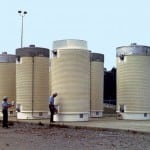Nevada Senators Harry Reid (D) and John Ensign (R) last week introduced a bill to create a national commission to study long-term alternatives to Yucca Mountain for managing nuclear waste in the U.S.
The bill proposes to create a nine-member panel of nongovernmental experts that could come up with a solution to the dilemma of how the nation will manage high-level radioactive waste and spent fuel. The blue ribbon commission would have two years to find alternatives to the underground nuclear waste repository at Yucca Mountain, Nev., a project that had been pursued by the Department of Energy for 20 years.
President Obama’s 2010 budget released earlier this month proposed to slash all funding for that project, except for “costs necessary to answer inquiries from the Nuclear Regulatory Commission, while the Administration devises a new strategy toward nuclear waste disposal.”
“Now that Yucca is out of the picture, we need to study what our options are to safely and responsibly deal with our nation’s nuclear waste,” Reid said in a statement last week.
Under the bill, the commission would evaluate “potential improvements” in the U.S. approach to high-level nuclear waste and spent fuel management if Yucca Mountain never becomes operational. The group would also assess and report the alternative’s feasibility, cost, risks, legal issues, public health issues, and environmental impact. For example, the panel would examine cost-sharing between the government and private industry, and whether the nuclear waste disposal program should be moved from the DOE to a government corporation.
Energy Secretary Steven Chu on March 5 told the Senate Energy Committee that Yucca Mountain was no longer viewed as an option for storing reactor waste. Instead, he said, the Obama administration believes the nearly 60,000 tons of used reactor fuel can remain at nuclear power plants while a new comprehensive plan is developed.
Nuclear waste is currently located in more than 120 locations in 39 states. For each year beyond 2017 that Yucca Mountain’s opening is delayed, the DOE estimates that U.S. taxpayers’ potential liability to contract holders who have paid into the Nuclear Waste Fund will increase by about $500 million.
“This will be in addition to the estimated current potential liability of approximately $7.0 billion due to the Department’s not beginning removal of spent nuclear fuel in 1998 as required by contract,” Ward Sproat, director of the Office of Civilian Radioactive Waste Management, told the U.S. House of Representatives last year.
Sources: Las Vegas Review, OCRWM, Senate Energy Committee








